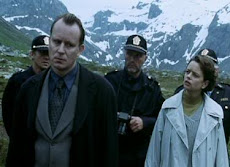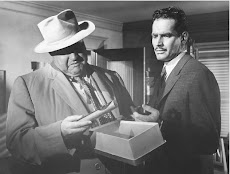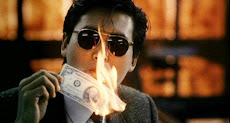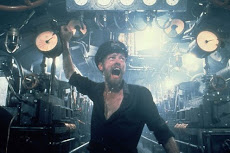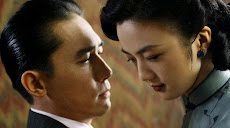 An individual character study is a difficult cinematic feat. Especially when facing an American audience, directors seldom have a prayer of pleasing both moviegoers and mainstream critics. The result is often polarized, and that's not going to do directors any favors come awards season.
An individual character study is a difficult cinematic feat. Especially when facing an American audience, directors seldom have a prayer of pleasing both moviegoers and mainstream critics. The result is often polarized, and that's not going to do directors any favors come awards season.The right ensemble piece can be almost as magical as an individual character study: so it goes with standouts like Whit Stillman's Metropolitan, Kevin Smith's Clerks, and even (I daresay) Tarantino's Reservoir Dogs. (It's worth noting that all of these are independent films.) Given that just about any movie with more than one recognizable character could be called an "ensemble," I should clarify that my definition should only encompass character-driven stories. That definition is still more broad than I'd like, but it should keep Independence Day and Transformers out, which is about all I'm concerned with. Despite the effort required for a good ensemble piece, an individual character study--whether running 90 minutes or a 2+ hours--is far trickier, and often turns out flawed.
Americans played little or no part in crafting early cinematic character studies. We loved our epics, and we loved our ensembles, and no one thought better of it until the 1970s. By then, Kurosawa's Ikiru (a still from which adorns the upper left corner of this blog) was almost two decades old, and French New Wave was away to the races with everything from The 400 Blows to Le Samourai.
The '70s set the standard for America, a high bar that I personally haven't seen reached since. I've posted previously about Dude (not to be confused with Bro)-films, and two of these might fit the bill for character studies: High Fidelity and About Schmidt, mostly the latter. But even a good chunk of Warren Schmidt's journey is driven more by events in his life, not deliberate introspection or meandering. We leave that to one of Jack Nicholson's early defining performances in Bob Rafelson's Five Easy Pieces. (Oddly enough, a bright shining star in the career of a director who otherwise did little but help Nicholson pay for the Learjet.)
What makes Five Easy Pieces work? To be frank: beats the heck outta me.
 But comparing it to a similar and more recent film, Greenberg, helps to clear it up.
But comparing it to a similar and more recent film, Greenberg, helps to clear it up.The individual-driven story is rare today, so rare that Noah Baumbach made a rather big deal out of trying it when he wrote and directed Greenberg just last year. In Greenberg, Ben Stiller plays Roger Greenberg, a musician who never made it. He had the opportunity to sign a record deal with his band, but turned it down in the name of artistic purity. Now he's a misanthrope, and has returned to L.A. after a long residence in New York to house-sit for his more grounded and successful brother.
Juxtapose this with Five Easy Pieces: Jack Nicholson plays Robert Dupea, a musician who could have made it, but walked away from being a pianist. He's a misanthrope, and returns to his home in the Pacific Northwest to visit his dying father and see his more grounded and reasonably successful siblings.
The tones of the film are entirely different-- Ben Stiller has yet to break into a truly dramatic performance-- but the characters themselves are not. They look the past with a good amount of disdain, have little regard for their futures, and cannot seem to figure out why. Plenty of decent people would like to see either of these aged adolescents taken to the woodshed, yet their aimless yearning (or yearning aimlessness?) draws enough sympathy-- I say empathy-- to be likeable, even loveable. We all have these existential crises, these men have simply embraced them.
Nevertheless, Greenberg's story wanders far too much and settles into a romantic angle that fails to enthrall, much less convince. Rather than grow out of his funk or far beyond a few petty realizations (e.g., that he owed it to his band mates to consult with them before turning down the record deal), Greenberg finds Florence (Greta Gerwig) and they fall into a cliche "I'm OK / You're OK" relationship that will of course fail, but since the movie ends before this can happen it's not supposed to be too much of a concern. If Baumbach had made this film on the heels of Kicking and Screaming, he may have had more success, but to make such a dated film a clear decade after the '90s ended hints that a biography of Baumbach himself may be more compelling than his contrived Roger Greenberg.
Five Easy Pieces suffers no such flaws. The weight Robert Dupea carries-- a never-quite-articulated combination of guilt, fear, and anger-- burdens him throughout. Instead of a fake band-aid to treat the bad feelings, the audience never even gets the full diagnosis. We're treated to a pretty good idea, capped off with this monologue (God bless YouTube and fair use):
"We both know that I was never really that good at it, anyway."
Maybe it's story, maybe it's actors, maybe it's subtlety, maybe it's all of these and more. There obviously isn't a set formula, since character studies are so tricky and, like Greenberg, just don't work. But when they do work? Stand back. Or, literally, sit back and savor the show.


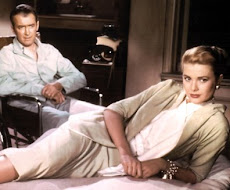_01.jpg)






